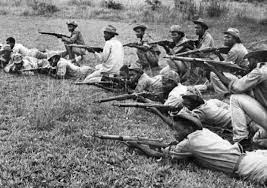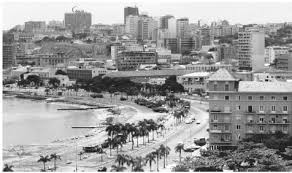This post discusses the political history of Angola from the early history to the Portuguese colony and the adoption of new constitution.
HISTORY
Angola was first settled by San hunter-gatherer societies before the northern domains came under the rule of Bantu states such as Kongo and Ndongo. In the 15th century, Portuguese colonists began trading, and a settlement was established at Luanda during the 16th century. Portugal annexed territories in the region which were ruled as a colony from 1655, and Angola was incorporated as an overseas province of Portugal in 1951. After the Angolan War of Independence, this ended in 1974 with army mutiny and leftist coup in Lisbon, Angola achieved independence in 1975 through the Alvor Agreement. After independence, Angola entered a long period of civil war that lasted until 2002.
PORTUGUESE COLONY
The Portuguese colony of Angola was founded in 1575 with the arrival of Paulo Dias de Novais with a hundred Portuguese families and four hundred soldiers. Its center at Luanda was granted the status of city in 1605.The King of the Kongo soon converted to Christianity and adopted a similar political structure to the Europeans. He became a well-known figure in Europe, to the point of receiving missives from the Pope. The south of the Kingdom of the Kongo, around the river Kwanza, there were various important states. The most important of these was the Kingdom of Ndongo or Dongo, ruled by the ngolas. At the time of the arrival of the Portuguese, Ngola Kiluange was in power. By maintaining a policy of alliances with neighboring states, he managed to hold out against the foreigners for several decades but was eventually beheaded in Luanda. Years later, the Ndongo rose to prominence again when Jinga Mbandi (Queen Jinga) took power. A wily politician, she kept the Portuguese in check with carefully prepared agreements. After undertaking various journeys she succeeded in 1635 in forming a grand coalition with the states of Matamba and Ndongo, Kongo, Kassanje, Dembos and Kissamas. At the head of this formidable alliance, she forced the Portuguese to retreat.
POLITICAL HISTORY OF ANGOLA
Since the adoption of a new constitution in 2010, the politics of Angola takes place in a framework of a presidential republic, whereby the President of Angola is both head of state and head of government, and of a multi-party system. Executive power is exercised by the government. Legislative power is vested in the President, the government and parliament.
The current political regime in Angola is presidentialism, in which the President of the Republic is also head of state and government; it is advised by a Council of Ministers, which together with the President forms the national executive power. Legislative power rests with the 220 parliamentarians elected to the National Assembly. The President of the Republic, together with the parliament, appoints the majority of the members of the two highest bodies of the judiciary, that is, the Constitutional Court and the Supreme Court. The judiciary is still made up of the Court of Auditors and the Supreme Military Court.
ADOPTION OF NEW CONSTITUTION
Since the adoption of a new constitution in 2010, the politics of Angola takes place in a framework of a presidential republic, whereby the President of Angola is both head of state and head of government, and of a multi-party system. Executive power is exercised by the government. Legislative power is vested in the President, the government and parliament.
Read: POLITICAL HISTORY OF MOROCCO
Angola changed from a one-party Marxist-Leninist system ruled by the Popular Movement for the Liberation of Angola (MPLA), in place since independence in 1975, to a multiparty democracy based on a new constitution adopted in 1992. That same year the first parliamentary and presidential elections were held. The MPLA won an absolute majority in the parliamentary elections. In the presidential elections, President José Eduardo dos Santos won the first round election with more than 49% of the vote to Jonas Savimbi’s 40%. A runoff election would have been necessary, but never took place. The renewal of civil war immediately after the elections, which were considered as fraudulent by UNITA, and the collapse of the Lusaka Protocol, created a split situation. To a certain degree the new democratic institutions worked, notably the National Assembly, with the active participation of UNITA’s and the FNLA’s elected MPs – while José Eduardo dos Santos continued to exercise his functions without democratic legitimation. However the armed forces of the MPLA (now the official armed forces of the Angolan state) and of UNITA fought each other until the leader of UNITA, Jonas Savimbi, was killed in action in 2002.

From 2002 to 2010, the system as defined by the constitution of 1992 functioned in a relatively normal way. The executive branch of the government was composed of the President, the Prime Minister and Council of Ministers. The Council of Ministers, composed of all ministers and vice ministers, met regularly to discuss policy issues. Governors of the 18 provinces were appointed by and served at the pleasure of the president. The Constitutional Law of 1992 established the broad outlines of government structure and the rights and duties of citizens. The legal system was based on Portuguese and customary law but was weak and fragmented. Courts operated in only 12 of more than 140 municipalities. A Supreme Court served as the appellate tribunal; a Constitutional Court with powers of judicial review was never constituted despite statutory authorization. In practice, power was more and more concentrated in the hands of the President who, supported by an ever-increasing staff, largely controlled parliament, government, and the judiciary.
The 26-year-long civil war has ravaged the country’s political and social institutions. The UN estimates of 1.8 million internally displaced persons (IDPs), while generally the accepted figure for war-affected people is 4 million. Daily conditions of life throughout the country and specifically Luanda (population approximately 6 million) mirror the collapse of administrative infrastructure as well as many social institutions. The ongoing grave economic situation largely prevents any government support for social institutions. Hospitals are without medicines or basic equipment, schools are without books, and public employees often lack the basic supplies for their day-to-day work.
José Eduardo dos Santos stepped down as President of Angola after 38 years in 2017, being peacefully succeeded by João Lourenço, Santos’ chosen successor. However, President João Lourenço started a campaign against corruption of the dos Santos era. In November 2017, Isabel dos Santos, the billionaire daughter of former President José Eduardo dos Santos, was fired from her position as head of the country’s state oil company Sonangol. In August 2020, José Filomeno dos Santos, son of Angola’s former president, was sentenced for five years in jail for fraud and corruption. In August 2022, the ruling party, MPLA, won another outright majority and President Joao Lourenco won a second five-year term in the election. However, the election was the tightest in Angola’s history.


